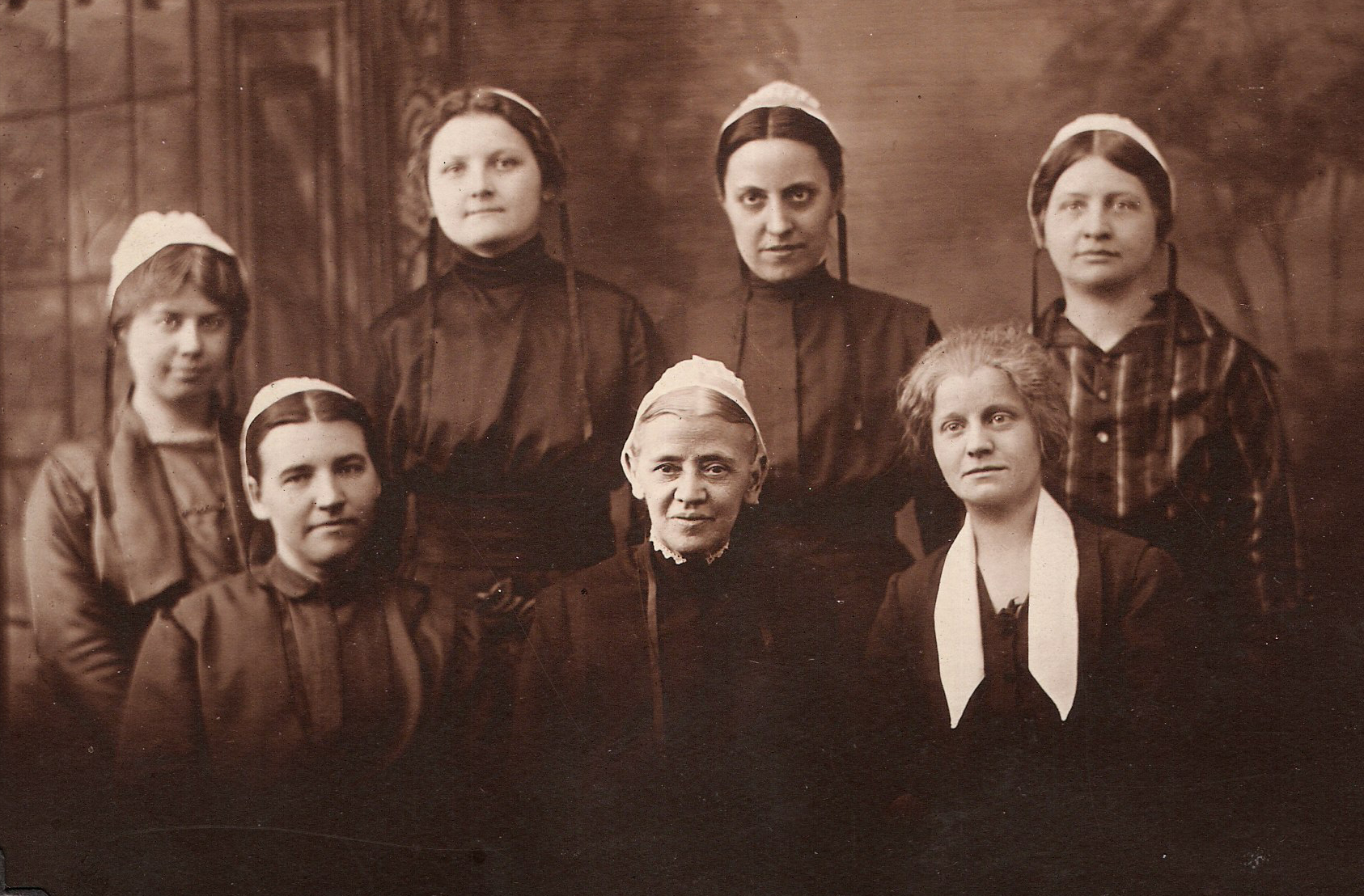
The denomination-sponsored seminar “Women as Pastors” wrapped up last week, with sessions in Ontario, Canada, and Ohio. Though slightly delayed in coming, today’s installment of the “Women as Pastors” series completes our present focus on the stories of pioneering Brethren in Christ women leaders with a portrait of Sarah H. Bert, a courageous Kansas farm girl that ventured from her home to the unknown landscape of Chicago to help launch an urban mission.
Sarah Bert solicited the first audience at the Chicago Mission by doing something that no respectable Brethren in Christ woman of her era would do: she bought perfume.
Of course, her actions were not — in reality — as audacious as an uninformed bystander might presume. As E. Morris Sider writes in his biography of Bert:
About 10 a.m., the door bell rang; two little Jewish girls were selling perfume. Sister Sarah bought some, although, of course, she would not use it, being the proper Brethren in Christ lady that she was. Then she said to the girls: “I’ve bought some of your perfume; now I want you to do something for me.” She asked them to come to Sunday school on Sunday morning and to bring some friends with them. On Sunday the girls appeared, with four non-Jewish companions. They, with eight adults, comprised the first audience at Chicago Mission.
Contrary to what this story might suggest, Bert — or “Sister Sarah,” as she was commonly known — was not an outgoing, confident woman. Yet she went on to serve capably at the Brethren in Christ Church’s first urban mission for more than 50 years.
Sister Sarah scatters deeds of Christian kindness along the path of her fellow Chicagoans, after the jump.
Born and bred in the farm country of Chambersburg, Pa., and Abilene, Kans., her decision to come to Chicago was the result of some profound spiritual encounters (described in detail in Sider’s account); nonetheless, the move left the quiet, plain-dressed, and often sickly farm girl feeling out of place in the bustling urban atmosphere.
But she did, as Sider’s biography recounts, become immediately invested in the work of the Mission — especially in its social outreaches. Stories about, but this excerpt provides particular insight into her heart for others:
Sister Sarah had been in mission work for only a few weeks when . . . means of helping . . . young girls . . . opened to her. One day while walking on the street she met a Mrs. Clark, who was connected with another mission (the Fruitful Vine Mission) in the city. Mrs. Clark operated a sewing school in the mission for girls of ten years and older. She invited Sister Sarah to visit her class and to help in the work. Sister Sarah reluctantly went, became fascinated with what she saw, and stayed to help teach.

Soon, as Sider tells, the class got too big and was divided: those living near the Fruitful Vine Mission remained at Mrs. Clark’s class, while those living closer to the Brethren in Christ Mission attended a new class taught by Bert. Her class started small, with only 35 students and 6 teachers; eventually, it reached as many as 80 students.
Sider goes on to describe the benefits of the class:
Aside from the clothing it provided for poor people, the sewing class was directed toward the moral improvement of the young girls [that attended it]. It was to assist them, Sister Sarah once explained, to escape the fate that surrounds them by learning how to . . . make a living.
Bert’s work with the sewing class, as well as other initiatives, earned her a reputation for compassion and effective work among Chicago’s neediest communities. Despite her initial fears of inadequacy and some considerable personal crises suffered during her early years of work, Bert persisted, and was awarded for her determination. In 1905, she was named superintendent of the Mission — a promotion, insists Sider, that was both well-deserved and unprecedented within the Brethren in Christ at that time:
It was a logical appointment. Now forty-five years of age, with more experience in city missions than anyone in the denomination, she was clearly the best choice for superintendent. The appointment of a woman, however, to such a responsible position was at that time unique among the Brethren in Christ, and is illustrative of the opportunities that the new mission program, both foreign and home, would soon open to women in the denomination.
Of course, Sider is referring to (among other women) H. Frances Davidson, a long-time Brethren in Christ foreign missionary in present-day Zambia and Zimbabwe. But not even Davidson, one of the most accomplished and well-educated women of her day, was selected to serve as mission superintendent; in this role, Bert is unparalleled.
Bert went on to serve at the Mission for more than 50 years. And she, over the years, inaugurated a number of outreach programs aimed at improving the living conditions (both moral and physical) of her fellow Chicagoans.
Perhaps Bert’s enduring legacy can be summed up in an eloquent sentence she once penned in an Evangelical Visitor article: “Few would ever get to God were there no deeds of kindness scattered along their path by Christian hearts and loving hands.”
For more on Sarah Bert, see her biography in E. Morris Sider, Nine Portraits: Brethren in Christ Biographical Sketches (Nappanee, Ind.: Evangel Press, 1978), 17-45. All above quotes are taken from that essay.

Very interesting. I am interested in women in history in many different roles. One area of interest to me is women in ministry. In my own faith tradition, the Methodists, women have a long history of mission work which I am just beginning to explore.
I like your blog and will definitely return. Thank you.